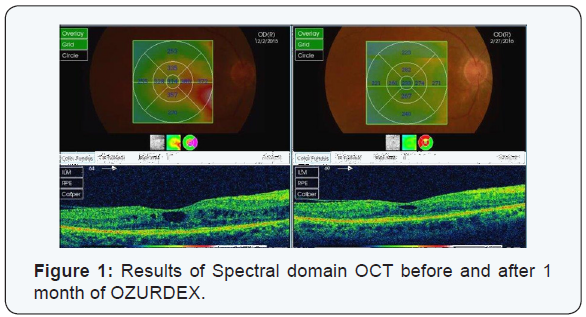JUNIPER
PUBLISHERS- JOJ Ophthalmology
Abstract
Introduction: Retinitis
pigmentosa is a clinically & genetically diverse group of diffuse
retinal dystrophies that initially affecting rod with subsequent
degeneration of cones, Maculopathy is one of the complications of RP
that affecting vision and usually takes different types 1. (Atrophic),
2. (Cystoid Macular Edema) 3.(Macular retraction), The prevalence of CME
was 52% in AD RP , 39 % in AR RP and 35% in XL.
Methods: We retrospectively
review a 24y old male patient that presented with bilateral refractory
Cystoid macular edema secondary to RP which is not responding to topical
carbonic an hydrase inhibitor and multiple anti VEGF injections of
Lucent is in both eyes, the patient underwent bilateral 0.7 mg
Intravitreal dexamethasone (OZURDEX) implant of 1 week apart, the
spectral domain OCT was performed before and one month after OZURDEX
injection and to assess the efficacy of Intravitreal steroid implants in
treatment of refractory CMO in RP.
Results: The Spectral Domain OCT
after 1 month of injection showed a significant anatomical and
functional improvements, CMT improved from 314 um to 233 um in the right
eye and from 590 um to 207 um in the left eye. The BCVA improved from
6/18 to 6/9 in the right eye and from CF 1 meter to 6/60 in the left
eye.
Conclusion: It seems that the
refractory CMO in RP is mostly inflammatory driven, for this reason it
shows a dramatic response to Intravitreal steroids, in our case, the
patient has received multiple anti VEGF injections of Lucent is with no
improvement, but he responded very well anatomically and functionally to
Intravitreal steroid implant of OZURDEX, the results in our case was
matching other small case series results, EX: In retrospective study of
Ozdemir et al reported the efficacy of Intravitreal steroid in a group
of five eye of five patients. Further preferably randomized trials may
establish the place of Intravitreal dexamethasone in the treatment of
refractory CME related to RP [1,2].
Keywords: Dexamethasone; Ozurdex® treatment; Retinitis pigmentosa; Cystoid macular edmaAbbreviations: CMO: Cystoid Macular Edema; RP: Retinitis Pigmentosa; CMT: Central Macular Thickness; VEGF: Vascular Endothelial Growth Factor; BCVA: Best Corrected Visual Acuity
Discussion
It seems that the refractory CMO in RP is mostly
inflammatory driven, for this reason it shows a dramatic response to
Intravitreal steroids, The pathogenesis of RP-related macular edema is
still not known. Spalton et al. [3] investigated 25 patients with RP and
angiographic retinal leakage. Edema was present in dominant and
X-linked inherited disease and was likely to be present in recessive
disease as well. The authors suggested that this might be a general
inflammatory response seen in many types of tapetoretinal degeneration
against actively degenerating photoreceptors and retina pigment
epithelium (RPE). Küchle et al. [4] investigated blood-aqueous barrier
in patients with RP with a laser cell photometer in 56 eyes of 29
patients and found that aqueous flare values were higher in patients
with RP than in controls and patients with RP- related CME had even
higher values with a mean of 14.66 photon counts per millisecond
compared with 9.65 for patients with RP without CME. Furthermore,
Heckenlively et al. [5] looked for the presence of antirational
antibodies in a group of 30 consecutive patients with RP and CME, 30
consecutive patients with RP but without CME and 50 normal subjects.
Twenty-seven (90%) of patients with RP and CME had antirational protein
antibody activity compared with three (6%) of 50 normal subjects and
only four (13%) of 30 control patients with RP with no CME (Figures 1
& 2).


Conclusion
This study suggests that patients with RP and CME may
have an underlying autoimmune process that is contributing
to the macular edema formation in RP. Based on these findings,
Intravitreal steroids were administered in small case series
with RP-related CME to modulate this autoimmune process
and the inflammatory mediators, in our case, the patient has
received multiple anti VEGF injections of Lucent is with no
improvement, but he responded very well anatomically and
functionally to Intravitreal steroid implant of OZURDEX, the
results in our case was matching other small case series results,
EX: In retrospective study of Ozdemir et al reported the efficacy
of Intravitreal steroid in a group of five eye of five patients.
Further preferably randomized trials may establish the place of
Intravitreal dexamethasone in the treatment of refractory CME
related to RP [6-14].
For more articles in JOJ Ophthalmology (JOJO) please click on: https://juniperpublishers.com/jojo/index.php
No comments:
Post a Comment